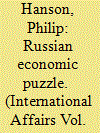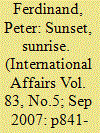| Srl | Item |
| 1 |
ID:
079088


|
|
|
|
|
| Publication |
2007.
|
| Summary/Abstract |
The oil monarchies of the Persian Gulf region have typically been portrayed as patriarchal autocracies characterized by traditional tribal rule that have taken on the characteristics of a modern state. The historical debate on these rentier states has centred on how their substantial oil income since the 1970s has allowed them to pacify their citizenry from making demands for enfranchisement. Power was thus firmly able to rest with the elites. Since the end of the Cold War, winds of change flamed the desire for reform and the late 1990s saw significant political changes. The empirical data indicates that this pace has increased, albeit at differential speeds, within the context of the post-9/11 war on terror. Interestingly, this has been the case despite turmoil in Iraq and a shift to the right in Iranian politics. The fundamental drivers of reform in the Arab oil monarchies continue to be the ruling elites themselves, however. The character of the reforms does appear to be mainly liberalizing rather than democratizing, but developments in some oil monarchies suggest that this process can be viewed as an early or intermediate stage of a wider enfranchisement of civil society
|
|
|
|
|
|
|
|
|
|
|
|
|
|
|
|
| 2 |
ID:
079087


|
|
|
|
|
| Publication |
2007.
|
| Summary/Abstract |
This article analyses the nature of the current Russian system and its future trajectory. First, the continuity between the Yeltsin and Putin presidencies is made clear. The nature of the Russian system has, to a great extent, been influenced by Yeltsin, who strengthened demands not for independent institutions but for a new and more powerful authoritarian leadership. Putin has consolidated the system, based on personalized power. But despite signs of economic growth and outward stability there is evidence that the Russian system is unsustainable in the long-term. The current system is based on a modification of the petro-economy that reproduces the merger between power and business with the rentier class. Thus far, however, the model has not been able to solve social conflicts or stop the degradation of 'human capital'. Nor is it likely to do so in the future
|
|
|
|
|
|
|
|
|
|
|
|
|
|
|
|
| 3 |
ID:
079086


|
|
|
|
|
| Publication |
2007.
|
| Summary/Abstract |
The question addressed in this article is whether the recent strong growth of the Russian economy is sustainable. The main difficulty is assessing the conflicting evidence. Developments since the financial crisis of 1998 are reviewed, including growth performance and macro-economic management. There is an analysis of the nature and extent of Russian economic dependence on exports of oil and gas and the direction towards state control since 2003 is described. The article reviews the interaction of competitive power politics among the political elite with economic policy and assesses factors favouring and factors working against continued rapid growth over the next five years. One conclusion is that informal rules operating in the economy differ across sectors, and Russian economic development is in part robust; but there are powerful influences working towards a slowdown in growth
|
|
|
|
|
|
|
|
|
|
|
|
|
|
|
|
| 4 |
ID:
079085


|
|
|
|
|
| Publication |
2007.
|
| Summary/Abstract |
This article argues that 2003-4 were decisive years in Russo-Chinese relations. Uncertainties over Russia's commitment to supply China with much needed energy revived deep-seated anxieties about the whole future of their relationship. However, by the autumn of 2004 they had launched plans for strengthening the partnership and widening mutual popular understanding. It also argues that this coincides with new efforts to view their foreign policies through the lens of constructivism, instead of realism. The article then looks at developments in bilateral economic relations and in the Shanghai Cooperation Organization, before adumbrating their wider advocacy of multilateralism, linking this to converging relations with India. Finally, it argues that relations with the US will continue to have a significant impact on the direction and closeness of this bilateral relationship. It is still a partnership rather than an alliance. Russia and China may sometimes put a higher priority on their relations with the West rather than on each other. Yet they are also looking at other potential emerging powers and how they can bend that process of emergence to their advantage.
|
|
|
|
|
|
|
|
|
|
|
|
|
|
|
|
| 5 |
ID:
079089


|
|
|
|
|
| Publication |
2007.
|
| Summary/Abstract |
Between 2003 and 2006 UN Secretary General Kofi Annan pursued the most ambitious overhaul of the United Nations since its inception. This transformation effort aimed to make the UN more effective in addressing non-traditional threats and to persuade the United States to re-engage with the world body. Launched during a time that was unpropitious for achieving far-reaching change, the effort nonetheless produced some surprising agreements. Several factors prevented greater achievement: the episodic attention of the Bush administration and the personal agenda of John Bolton, the US permanent representative to the UN; the failure of the UN Secretariat to pursue a capital based strategy that engaged heads of state and foreign ministers; and the decision by many member states that they would rather have an ineffective United Nations than an effective one that furthered the interests of the Bush administration. Whether future efforts to transform collective security will fall victim to the same fate depends in part on the actions and words of a new American president in 2009
|
|
|
|
|
|
|
|
|
|
|
|
|
|
|
|